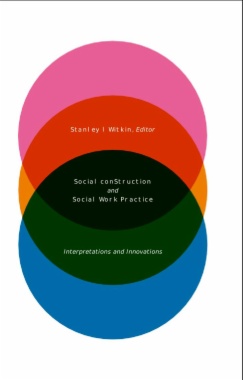Social construction addresses the cultural factors and social dynamics that give rise to and maintain values and beliefs. Drawing on postmodern philosophies and critical, social, and literary theories, social construction has become an important and influential framework for practice and research within social work and related fields. Embracing inclusivity and multiplicity, social construction provides a framework for knowledge and practice that is particularly congruent with social work values and aims.
In this accessible collection, Stanley L Witkin showcases the innovative ways in which social construction may be understood and expressed in practice. He calls on experienced practitioner-scholars to share their personal accounts of interpreting and applying social constructionist ideas in different settings (such as child welfare agencies, schools, and the courts) and with diverse clientele (such as "resistant" adolescents, disadvantaged families, indigenous populations, teachers, children in protective custody, refugee youth, and adult perpetrators of sexual crimes against children). Eschewing the prescriptive stance of most theoretical frameworks, social construction can seem challenging for students and practitioners. This book responds with rich, illustrative descriptions of how social constructionist thinking has inspired practice approaches, illuminating the diversity and creative potential of practices that draw on social constructionist ideas.
Writing in a direct, accessible style, contributors translate complex concepts into the language of daily encounter and care, and through a committed transnational focus they demonstrate the global reach and utility of their work. Chapters are provocative and thoughtful, reveal great suffering and courage, share inspiring stories of strength and renewal, and acknowledge the challenges of an approach that complicates evidence-based evaluations and requirements.
- Contents
- Foreword
- Preface
- 1. Beginning the Journey
- 2. An Introduction to Social Constructions
- 3. Honoring Client Perspectives Through Collaborative Practice: Shifting from Assessment to Collaborative Exploration
- 4. Becoming a Social Constructionist: From Freudian Beginnings to Narrative Ends
- 5. The Car, the Rain, and Meaningful Conversation: Reflexivity and Practice
- 6. Thinking and Acting Constructively in Child Protection
- 7. Mostly We Played with Whatever She Chose
- 8. Shedding Light on the Expert Witness Role in Child Welfare Work: The Value of Social Constructionism
- 9. Family Therapy with a Larger Aim
- 10. Opening a Space for Hope in a Landscape of Despair: Trauma and Violence Work with Men Who Have Sexually Abused Minors
- 11. Narrative Supervision and Professional Development for School Teachers in Hong Kong
- 12. When Woman-at-Risk Meets Youth-at-Risk: Engaging the Discursive Practices of the Nation-State
- Contributors
- Index

